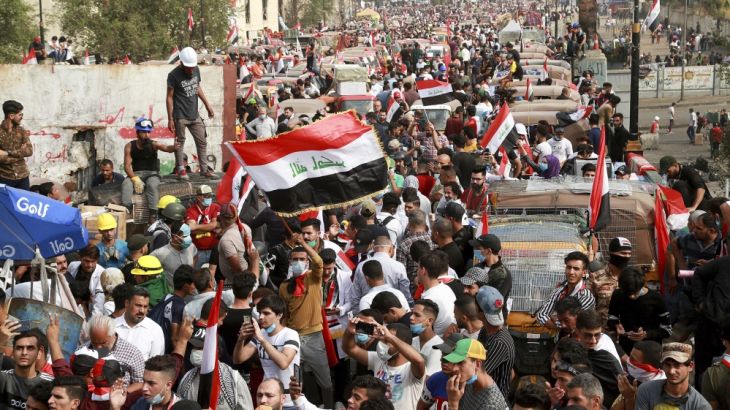Iraqi protesters block roads, shutting offices and schools
Demonstrators shut down key streets and students stage sit-ins as protests seeking political system’s overhaul escalate.

Demonstrators have shut down major streets in Iraq‘s capital, intensifying a weeks-long protest movement calling for an overhaul of the political system amid growing anger over poor governance and lack of economic opportunity.
In a move that appeared to follow a tactic adopted by protesters in Lebanon, where similar demonstrations have been under way since October 17, demonstrators in Baghdad on Sunday blocked key roads, highways and intersections.
Keep reading
list of 3 itemsRights group: Iraq education system on brink of collapse
Lebanon deadlock remains after PM quits
“Roads closed by order of the people,” read a banner in a road that was blocked with burning tyres and barbed wire.
University-age demonstrators, meanwhile, stopped traffic by parking cars in the middle of main thoroughfares, as police officers manning nearby checkpoints looked on without intervening.
Other students took part in sit-ins at their schools, while the country’s national teachers union extended the strike they launched last week. Engineering, doctors and lawyers’ syndicates have all backed the demonstrations.
Al Jazeera’s Natasha Ghoneim, reporting from Baghdad, said the day was “anything but a typical start to the work week”.
“Teachers are on strike, [classes] in Baghdad and other cities are cancelled,” Ghoneim said, adding that students were later expected to stage a protest in Tahrir Square in central Baghdad.
“In the eastern portion of Baghdad, the roads are an absolute mess. Protesters are blocking many major intersections, they are lighting tyres on fire making it difficult for people to get to work. As a result, various government offices and businesses have been closed.”
Demonstrators also blocked roads in the country’s south, as schools and government offices closed for the day. South of Basra, they blocked the highway leading to the Umm Qasr port, after security forces attempted to disperse a sit-in a day earlier.
In the eastern city of Kut, Tahseen Nasser, a 25-year-old protester, told AFP news agency: “We decided to cut the roads as a message to the government that we will keep protesting until the corrupt people and thieves are kicked out and the regime falls,”
“We’re not allowing government workers to reach their offices, just those in humanitarian fields,” including hospitals and police officers, he said.
Elections pledge
For a week in early October, ongoing grievances over poor governance, high unemployment and inadequate public services prompted tens of thousands of Iraqis in the capital, Baghdad, and across the country’s south to take to the streets to protest against the country’s ruling elite and the political system established after the United States-led invasion in 2003.
The mass demonstrations, which erupted again late last month after a three-week hiatus, have been met with a harsh response by security forces, who have used tear gas, rubber bullets and live ammunition against those protesting.
Last month, a government-appointed inquiry tasked with investigating the killings during the first wave of protests found that security forces had used excessive force. Some 250 people have been killed since the turmoil began.
|
|
Since the protests restarted on October 25 after a brief lull, there have been near-continuous clashes on two bridges leading to the heavily-fortified Green Zone, the headquarters of the government and home to several embassies.
Prime Minister Adel Abdul Mahdi met with top security officials late Saturday, stressing the need to preserve peace, security and the safety of the protesters.
President Barham Salih said last week he would approve a snap parliamentary vote once a new electoral law is passed, adding that Abdul Mahdi was willing to resign once political leaders agreed on a replacement.
Although he promised to present a draft of the new elections bill to parliament this week, the president gave no clear timeframe as to when elections might be held.
The pledges have seemingly failed to quell the unrest.
Despite Iraq’s vast oil wealth, nearly 60 percent of the country’s 40 million people live on less than $6 a day, World Bank figures show.
Millions lack access to adequate healthcare, education, clean water and electricity, with much of the country’s infrastructure in tatters.